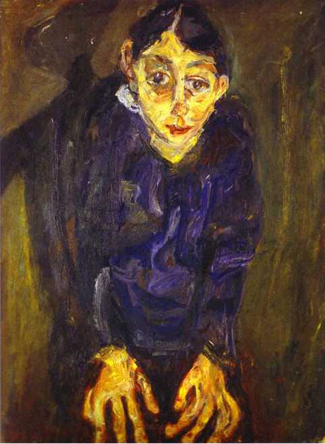Courses > Women's Studies Courses
Women and Madness: Critical Feminist Perspectives

© The Mad Woman, 1919, Chaim Soutine
For centuries, women in the West have been judged, dismissed, labeled, diagnosed, treated, pathologized, stigmatized, committed to institutions and burned at the stake for symptoms of supposed madness. For the most part, those holding the power to label, treat and commit have been middle/upper class, heterosexual males of European descent, and the labeling process has been found to be dangerously sexist, misogynist, racist, ableist, heterosexist and classist. Current and historic conceptualizations of normalcy, deviance, mental health and illness will be explored and critiqued through a feminist, interdisciplinary, intersectional lens.
Diverse feminist approaches to and debates about madness will be explored. The myriad behaviours long-held associated with women's madness along with psychiatry's proposed treatments including medication, institutionalization, and psychosurgery will be explored and analyzed. First-person accounts of psychiatric institutionalization and treatment will be analyzed and used to assess theoretical and disciplinary interpretations and treatments as well as both policy implications and personal possibilities. The course will close with a discussion regarding women's organizing and activisms.
Learning Objectives:
1. critically analyze current conceptualizations of mental health, mental illness and madness
2. explore the various anti-psychiatry movements in North America
3. examine how the intersectionalities of gender, race, class, abilities, sex and sexualities, age, etc.,are central to a critical feminist analysis of women and madness.
4. Analyze the values, assumptions, and beliefs regarding women's mental health programming, literature and policies.
5. Acknowledge and discuss how themes of difference, diversity, and societal marginalization impact on women's mental health and quality of life.
6. Critique health, social, educational, and economic policy decisions as they impact the lives of women
7. Demonstrate an understanding of the way that mental health systems, psychiatry and psychology and mental health professionals have defined women's mental health "problems"
8. Demonstrate familiarity with feminist scholarship and theory regarding women's mental health
Examples of Important Works:
Canadian Women's Health Network (2009) Special Issue on Women's Mental Health. 11(2) Spring/Summer.
Chesler, P. (2005). Women and Madness (Revised and Updated) Palgrave Publishing House, New York
Perkins-Gilman, C. (1892) (1997) The Yellow Wallpaper and Other Stories. Dover Publishing House, Dover, England.
Rochon Ford, A. & Saibil, D. (2010). The Push to Prescribe: Women & Canadian Drug Policy. Toronto: The Women's Press.
Schellenberg, S. & Barnes, R. (2009) Committed to the Sane Asylum: Narratives on Mental Wellness and Healing. Toronto: Wilfred Laurier Press.
Shannonhouse, Rebecca (2003). Out of Her Mind: Women Writing on Madness. NY: The Modern Library


